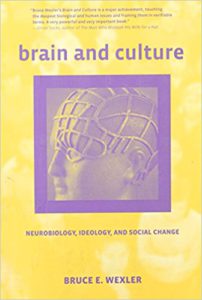Between 2008 and 2011, I wrote several brief reviews of books which appeared on the Education Review web site. Since then, the editors ceased publication of that type of review and removed the previously published brief reviews from the site. I am making the original drafts of my reviews available here.
Wexler, B. (2008). Brain and Culture: Neurobiology, Ideology, and Social Change. Cambridge, MA: The MIT Press.
By Dr. Gary L. Ackerman, February 2009
 Modern educators are working at an interesting time. Our work is influenced by an emerging body of knowledge from the diverse field known as cognitive science. Our work is influenced by an emerging culture in which information technology is creating unfamiliar economic and social norms and practices. Our work is influenced by frequently contradictory political pressures.
Modern educators are working at an interesting time. Our work is influenced by an emerging body of knowledge from the diverse field known as cognitive science. Our work is influenced by an emerging culture in which information technology is creating unfamiliar economic and social norms and practices. Our work is influenced by frequently contradictory political pressures.
Bruce Wexler’s Brain and Culture collects much of the recent research in cognitive science and interprets the cultural conflicts we observe in terms of that research. The five chapters begin with a review of brain research, including both animal studies and human studies; continue with a review of the social nature of the human brain and the neurological basis of culture; and finish with an interpretation of conflicts from the historic past to the recent past in light of the biological origins of culture.
Wexler explicates two essential points in the book: First, the environment in which a human brain develops exerts important influences on how that brain develops. In particular, Wexler describes the development of young brains and how parents and the social interactions of the culture create familiar patterns for a young human. Those early experiences become create expected patterns of reality as a brain develops. Second, when there exists an incongruity between the internal expectations of a brain and the external reality of a new situation conflict can result. For an individual, the conflict can be exhibited as denial of new information, forgetting new information, or interpreting new information in a manner consistent with previous expectations. For groups, the conflict can be exhibited as social conflict, sometimes violent social conflict. Wexler explores the incongruities that arise with the death of family members and with immigration; similar incongruities arising from other cultural changes are implicit.
For educators, this book is informative, understandable, and timely. This book is not pragmatic. Educators will not learn new strategies for creating effective classrooms, but educators will learn about the building blocks of human learning. Educators will learn about the role of the culture they create in their students lives, and educators will learn about the challenges global mobility pose for students and families. The fundamental understanding that can arise from Wexler’s book is essential for efficacious education.